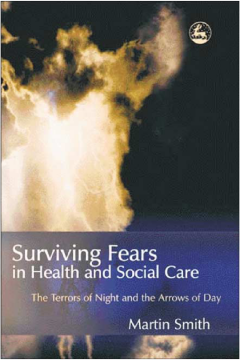
Additional Information
Book Details
Abstract
Fear can have significant and complex effects on the lives of those working in health and social care, yet it is rarely discussed or investigated. Drawing on powerful first-hand accounts, this book explores the fears experienced when working in child protection, mental health, and with marginalized groups of people, and suggests how these fears can be understood and managed.
The author provides helpful suggestions for good practice and training and describes the vital roles of supervision, management and workplace culture in helping practitioners cope with their distress. He also looks at how family members, colleagues and the police can provide support and discusses the benefits of recognizing and confronting openly the repercussions of fear, as well as celebrating its potentially positive and life-enhancing impact on practice.
Offering innovative new ways of thinking about and coping with fear, this book is essential reading for health and social care professionals, trainers, and managers who need to be aware of issues surrounding fear and anxiety within their organizations.
This is a useful book addressed to multiple audiences, including those who work in health and social care, their supervisors and managers and those involved in the professional education of practitioners. It considers how health and social care workers (particularly those who work in mental health and child protection) can think about and cope with the very real fears associated with their jobs. It offers an opportunity to think about how to balance the need to do the job with the need to protect yourself from avoidable risk and harm. It also explores avenues of support and ways to deal with the aftermath of frightening situations.
The book includes a good mix of quotations from people who have worked in a variety of health settings. It adds a thoughtful commentary, with theory and academic references used appropriately and in moderate doses.
Mental Health Today
Martin Smith is practitioner-manager of a Social Services Emergency Duty Team. In this role he works with service users of all ages, particularly in the fields of mental health and child protection. He has researched and published widely on fear and stress in health and social care settings.
This is an exceptionally interesting, well-written book about an area that is not well covered. It provides an in-depth discussion of how workers in health and social care experience fear and anxiety, and how they might be able to deal with them... At a time of defensive practice and decision-making, and with mounting anxiety about risk-taking, this is an extremely useful and timely publication.
Nursing Standard
Table of Contents
| Section Title | Page | Action | Price |
|---|---|---|---|
| Preface | |||
| Acknowledgements | |||
| About the editor | |||
| List of acronyms and abbreviations | |||
| 1. Introduction: WASH projects and complex adaptive systems | |||
| Kate Neely | |||
| 2. Systems thinking and transdisciplinarity in WASH | |||
| Kate Neely | |||
| 3. Using causal loop diagrams to understand handpump failure in sub-Saharan Africa | |||
| Elisabeth S. Liddle and Richard A. Fenner | |||
| 4. Applying social network analysis to WASH | |||
| Duncan McNicholl | |||
| 5. Social-ecological system resilience for WASH | |||
| Jeremy Kohlitz, Naomi Carrard, and Tim Foster | |||
| 6. Bureaucracy, WASH, and systems thinking | |||
| Chris Brown | |||
| 7. Learning for adaptive management: using systems thinking tools to inform knowledge and learning approaches | |||
| Melita Grant and Juliet Willetts | |||
| 8. Measuring impact in WASH from a complex adaptive systems perspective | |||
| Chris Brown | |||
| 9. WASH adaptation in Uganda (a practitioner case study) | |||
| Adam Harvey | |||
| 10. Resources for systems thinking | |||
| Kate Neely |
